News
Debt, Gender Gaps, and Underfunded Health Systems Threaten Africa’s Development Goals
KAMPALA – Africa is grappling with a mounting debt burden equivalent to 64.3% of its GDP, severely constraining its ability to invest in critical sectors such as education, health, and infrastructure, according to Mr. Claver Gatete, Executive Secretary of the
(UNECA).
Speaking at the opening of the 11th Africa Regional Forum on Sustainable Development, ARFSD in Kampala, Mr. Gatete highlighted the urgency for transformative action under the forum’s theme: “Driving Job Creation and Economic Growth through Sustainable, Inclusive, Science- and Evidence-Based Solutions for the 2030 Agenda and Agenda 2063.”
He noted that Africa’s average GDP growth since 2019 has hovered around 3%, far below the 7% required to meet the Sustainable Development Goal (SDG) targets on economic growth and poverty reduction.
“In light of current global dynamics, it is clear that development aid alone is no longer a viable or sustainable solution,” Mr. Gatete said. “Traditional financing models are falling short of supporting Africa’s development ambitions. At this critical juncture, we must take bold, evidence-based, and inclusive action—investing in our people and institutions to drive transformation.”
Citing data on SDG implementation, Mr. Gatete revealed that out of 144 assessed indicators, only 10 are on track, while 106 are progressing slowly, and 28 are regressing. Particularly concerning is the slow pace on SDG 5 (gender equality), which he warned could take decades to achieve if current trends persist.
“We simply cannot afford to continue at this pace,” he emphasized.
To accelerate progress, Mr. Gatete called for the forum to focus on five key SDGs: health and well-being, gender equality, decent work and economic growth, life below water, and partnerships for development.
On SDG 3 (good health and well-being), he pointed out that millions of Africans still lack access to quality healthcare. Four out of five African countries spend less than USD 86 per capita on health—well below the World Health Organization’s recommended minimum of USD 249.
“In 2022, health spending averaged only 7% of national budgets, half the 15% target set in 2001. We must close this gap by boosting domestic financing, strengthening health systems, and leveraging digital health solutions,” Mr. Gatete urged.
Mr. Gatete expressed concern over Africa’s slow progress on gender equality, questioning how the continent can prosper when half of its population remains economically marginalized.
“It is unacceptable that women still face barriers in education, finance, and employment. Although women now hold 26% of parliamentary seats, up from 19% in 2015, a 12% gender gap in mobile money access persists, despite $1.3 trillion in transactions in 2022,” he said.
He called for gender-responsive budgeting, digital inclusion, and more leadership opportunities for women.
Addressing SDG 8, Mr. Gatete highlighted the need to create sustainable livelihoods, noting that 83% of Africa’s workforce is in the informal sector, with over 113 million people either unemployed or underemployed.
“With nearly a third living in extreme working poverty, we must invest in vocational training, entrepreneurship, and social protections to harness the continent’s growing workforce—expected to reach one billion by 2030,” he said.
On SDG 14 (life below water), Mr. Gatete said Africa’s blue economy could grow from $296 billion in 2018 to $576 billion by 2063. However, it currently receives only 3.5% of SDG financing, while illegal fishing costs the continent $10 billion annually.
“Our ocean health index stands at just 52.7, well below the global average of 71.4. We must invest in aquaculture, coastal tourism, and nature-based carbon projects to unlock this potential,” he said.
Under SDG 17, Mr. Gatete emphasized the need for stronger regional and global cooperation, advocating for reforms to the global financial architecture and enhanced South- South, North-South, and Triangular Cooperation.
“No country can achieve the SDGs in isolation. Collective progress depends on robust partnerships, trade cooperation, and policy alignment,” he said.
Mr. Gatete proposed four strategic pillars for African leaders to consider:
- Mobilizing Domestic Resources – by expanding tax bases, increasing pension and sovereign wealth funds, improving revenue collection, and digitizing economies.
“Sustaining financial flows of $89 billion annually, coupled with enhanced remittance platforms, could significantly support development,” he noted. - De-risking Economies – to attract private sector investment through blended finance, credit guarantees, and capital market development.
- Expanding Access to Affordable Finance – especially for women and youth, through microfinance, digital tools, and impact investing.
“It is unacceptable that a 3% gender gap in financial inclusion still exists. Inclusive growth is not optional—it is essential,” he said. - Leveraging the African Continental Free Trade Area (AfCFTA) – to increase intra-African trade by 45% by 2045 and spur industrialization and job creation.
He urged leaders to invest in digital infrastructure, artificial intelligence, and evidence-based policy-making. “A continent-wide protocol on digital trade could transform e-commerce, expand market access, and create millions of jobs.”
Mr. Gatete concluded by reminding African leaders that time is running out.
“The next five years must be defined by bold leadership, decisive policies, and strong partnerships to place Africa on a path of sustainable prosperity,” he said.































